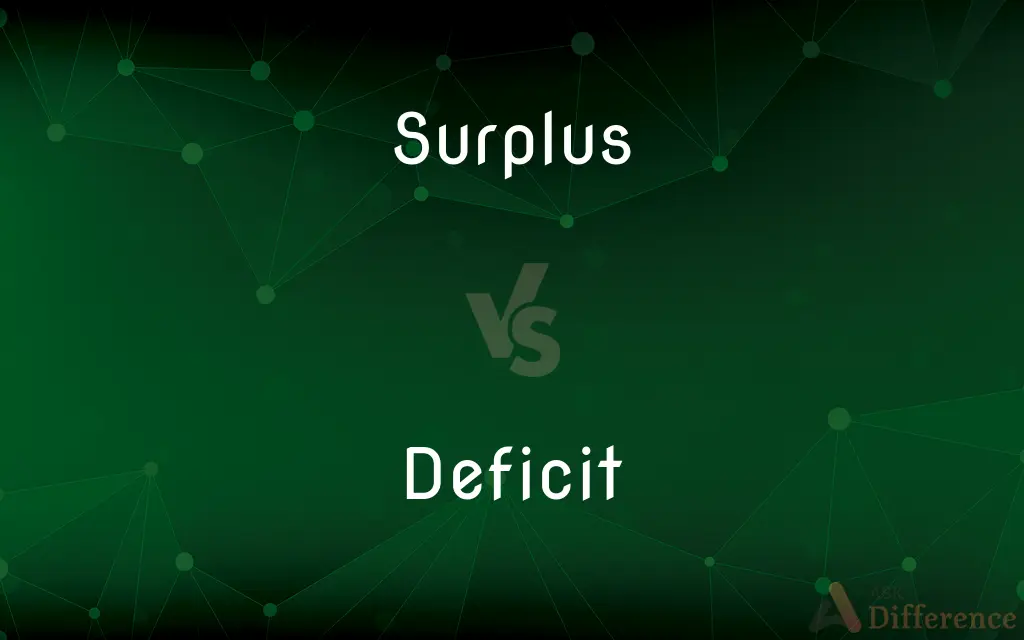Surplus vs. Deficit — What's the Difference?
By Tayyaba Rehman & Fiza Rafique — Updated on April 24, 2024
Surplus indicates an excess of resources or assets over liabilities, enhancing financial health; deficit denotes a shortfall where expenses exceed revenue, indicating financial stress.

Difference Between Surplus and Deficit
Table of Contents
ADVERTISEMENT
Key Differences
A surplus occurs when a business, government, or individual takes in more resources, such as money, goods, or services, than it expends, leading to an accumulation of excess. This is often seen as a positive indicator of financial health and efficiency. On the other hand, a deficit arises when expenditures surpass income, resulting in a shortage that may necessitate borrowing or budget cuts.
Surplus can lead to opportunities for investment or savings, providing a cushion against future economic downturns. It allows entities to fund new projects or expand reserves without incurring debt. Whereas a deficit often forces organizations or governments to borrow money, increasing their debt burden and potentially leading to higher interest expenses and financial vulnerability.
In terms of governmental finance, a budget surplus might allow a government to reduce taxes, increase spending, or pay down debt, contributing to economic stability or growth. Conversely, running a budget deficit often requires governments to increase borrowing, which can crowd out private investment and lead to higher long-term interest rates.
For individuals, maintaining a financial surplus can enhance credit scores, increase savings, and provide funds for investment opportunities. On the other hand, operating at a deficit can lead to accumulating debt, financial stress, and potential credit damage if not managed carefully.
Companies experiencing surplus profits often return value to shareholders through dividends or stock buybacks, potentially increasing the company's stock price. In contrast, companies facing deficits may need to cut costs, which could include layoffs or reduced product offerings, potentially harming their market position and employee morale.
ADVERTISEMENT
Comparison Chart
Definition
Excess of resources over expenditures
Shortfall where expenses exceed revenues
Financial Impact
Often indicates robust financial health
Suggests financial stress or inefficiency
Strategic Actions
Enables investment, savings, or debt reduction
May necessitate borrowing or budget cuts
Long-term Effect
Can lead to growth and stability
Potentially leads to increased debt and risk
Common in
Profitable companies, prudent governments
Economically strained entities, recession periods
Compare with Definitions
Surplus
Excess amount.
The company's financial surplus allowed for unexpected bonuses this year.
Deficit
Financial shortfall.
The budget deficit forced cuts in public services.
Surplus
Additional resources.
The surplus of grain this season drove prices down.
Deficit
Below required balance.
The trade deficit reflects more imports than exports.
Surplus
Beneficial balance.
The budget surplus led to a tax rebate for residents.
Deficit
Gap between desired and actual.
The team's efforts to close the skill deficit continue.
Surplus
More than needed.
The project ended with a surplus of materials.
Deficit
Lack of sufficient resources.
The organization faces a deficit in volunteer staff.
Surplus
Profit beyond expectations.
This year's surplus exceeded all forecasts.
Deficit
Insufficient amount.
There was a deficit of evidence in the case.
Surplus
An amount of something left over when requirements have been met; an excess of production or supply
Exports of food surpluses
Deficit
Inadequacy or insufficiency
A deficit in grain production.
Surplus
More than what is needed or used; excess
Make the most of your surplus cash
The firm told 284 employees that they were surplus to requirements
Deficit
A deficiency or impairment in mental or physical functioning.
Surplus
Being more than or in excess of what is needed or required
Surplus grain.
Deficit
The amount by which a sum of money falls short of the required or expected amount; a shortage
Large budget deficits.
Surplus
An amount or quantity in excess of what is needed.
Deficit
A business loss.
Surplus
Total assets minus the sum of all liabilities.
Deficit
An amount that quantifies an unfavorable condition or position
Rallied from a three-game deficit to win the playoffs.
Surplus
Excess of a corporation's net assets over the face value of its capital stock.
Deficit
Deficiency in amount or quality; a falling short; lack.
The crop output this year has been comparatively small, owing to the deficit in rainfall.
Surplus
Excess of receipts over expenditures.
Deficit
A situation wherein, or amount whereby, spending exceeds (e.g. government) revenue.
Surplus
That which remains when use or need is satisfied, or when a limit is reached; excess; overplus.
Deficit
Deficiency in amount or quality; a falling short; lack; as, a deficit in taxes, revenue, etc.
Surplus
Specifically, an amount in the public treasury at any time greater than is required for the ordinary purposes of the government.
Deficit
The property of being an amount by which something is less than expected or required
Surplus
(legal) The remainder of a fund appropriated for a particular purpose.
Deficit
An excess of liabilities over assets (usually over a certain period)
Surplus
(legal) assets left after liabilities and debts, including capital stock have been deducted.
Surplus
Being or constituting a surplus; more than sufficient.
Surplus population
Surplus words
The latest shipment of goods is surplus to our needs.
Surplus
(transitive) To treat as surplus to requirements; to sell off or dismiss from employment, etc.
Surplus
That which remains when use or need is satisfied, or when a limit is reached; excess; overplus.
Surplus
Specifically, an amount in the public treasury at any time greater than is required for the ordinary purposes of the government.
Surplus
Being or constituting a surplus; more than sufficient; as, surplus revenues; surplus population; surplus words.
When the price of corn falleth, men give over surplus tillage, and break no more ground.
Surplus
A quantity much larger than is needed
Surplus
More than is needed, desired, or required;
Trying to lose excess weight
Found some extra change lying on the dresser
Yet another book on heraldry might be thought redundant
Skills made redundant by technological advance
Sleeping in the spare room
Supernumerary ornamentation
It was supererogatory of her to gloat
Delete superfluous (or unnecessary) words
Extra ribs as well as other supernumerary internal parts
Surplus cheese distributed to the needy
Common Curiosities
How does a surplus affect an economy?
A surplus can stabilize or grow an economy by allowing for increased investments and savings.
Can a deficit ever be intentional?
Yes, governments sometimes run deficits intentionally to stimulate the economy during downturns.
What causes a surplus?
A surplus is caused by income exceeding expenditures through effective management or higher-than-expected revenue.
What are the consequences of a deficit?
Consequences include increased debt, potential cuts in services, and higher interest costs.
What is the difference between fiscal surplus and trade surplus?
A fiscal surplus refers to government budget excess, while a trade surplus refers to exporting more than importing.
What is a structural deficit?
A structural deficit occurs when a deficit is persistent, due to fundamental imbalances in income and expenditures.
Is it better to have a surplus or a deficit?
Generally, a surplus is preferred as it indicates financial health, but deficits can be strategic for growth.
How does consumer behavior impact surpluses and deficits?
Consumer spending affects business revenues and tax collections, influencing both surpluses and deficits.
How can a deficit be reduced?
Through increased revenue, decreased expenditures, or economic growth strategies.
What role does policy play in managing surpluses and deficits?
Policy decisions can direct how surpluses are utilized or how deficits are addressed through fiscal measures.
Are deficits always bad?
Not necessarily; strategic deficits can be used to fund growth initiatives and counter economic recessions.
Share Your Discovery

Previous Comparison
Electroplating vs. Galvanisation
Next Comparison
House vs. TranceAuthor Spotlight
Written by
Tayyaba RehmanTayyaba Rehman is a distinguished writer, currently serving as a primary contributor to askdifference.com. As a researcher in semantics and etymology, Tayyaba's passion for the complexity of languages and their distinctions has found a perfect home on the platform. Tayyaba delves into the intricacies of language, distinguishing between commonly confused words and phrases, thereby providing clarity for readers worldwide.
Co-written by
Fiza RafiqueFiza Rafique is a skilled content writer at AskDifference.com, where she meticulously refines and enhances written pieces. Drawing from her vast editorial expertise, Fiza ensures clarity, accuracy, and precision in every article. Passionate about language, she continually seeks to elevate the quality of content for readers worldwide.














































